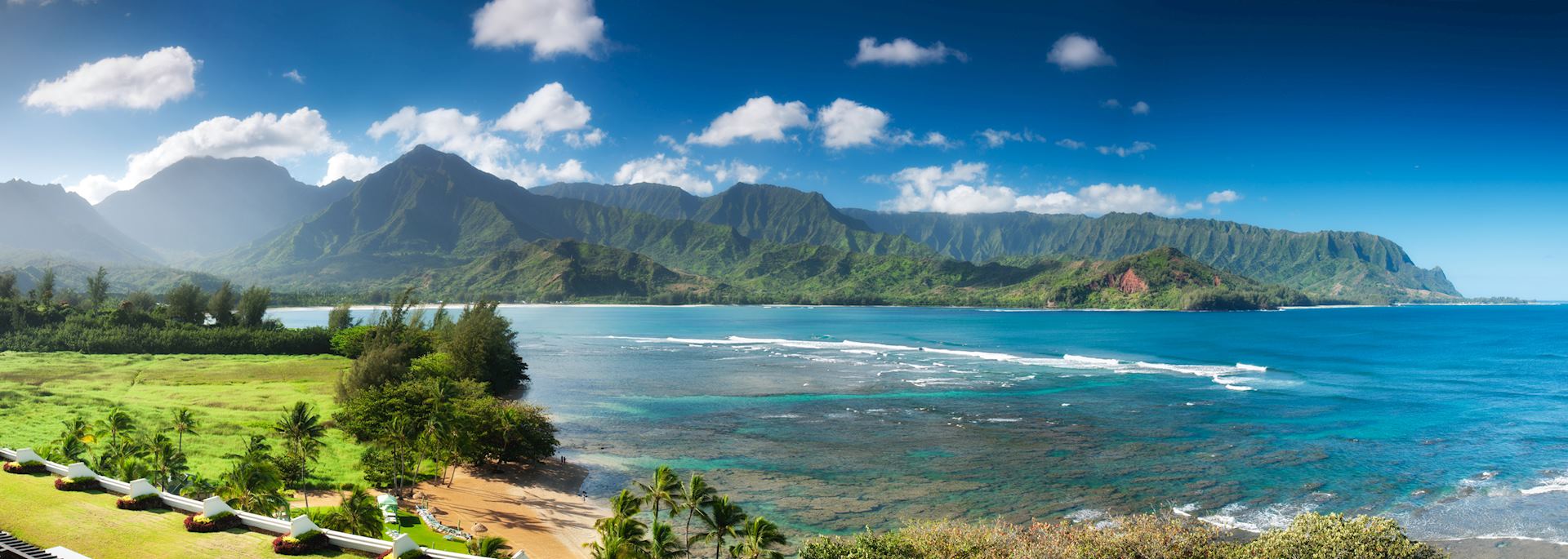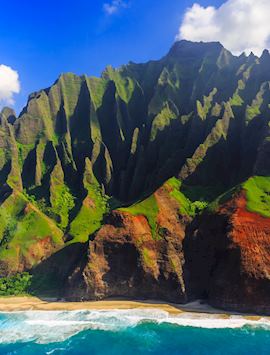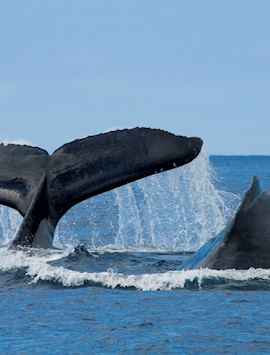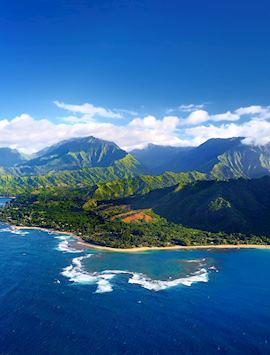By Audley specialist Gillian
Hawaii is often perceived as a tropical island paradise, where white sands merge with clear water and days are given up to relaxing beneath palm trees. While this is true to some extent, it’s by no means the whole story. Forested hiking trails lead to hidden waterfalls, while scenic drives and helicopter rides take in coastlines that have turned the heads of Hollywood filmmakers.
Formed by volcanic activity millions of years ago, the islands continue to be shaped by the ever-apparent forces of nature. You can observe molten lava bubbling and glowing in Hawaiʻi Volcanoes National Park and snorkel among tropical fish in the submerged Molokini volcanic crater.
How many islands can you cover in a trip?
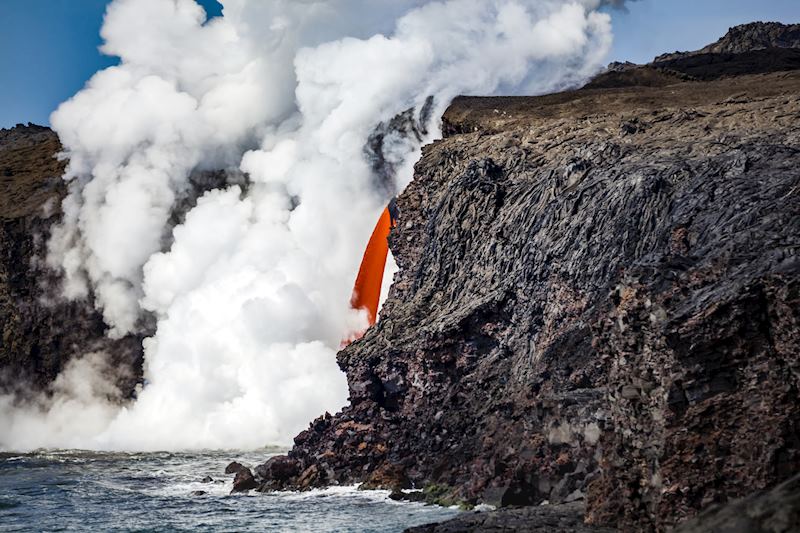
Part of the joy of visiting Hawaii is that you can pick and choose from its six main islands: Oʻahu, Kauaʻi, Maui, the island of Hawaiʻi and the two smaller islands of Molokaʻi and Lānaʻi. Each offers something different, from adventurous outdoor activities and the trademark sandy beaches, to volcanic formations, winding coastal drives, and traditional Hawaiian culture.
Oʻahu, Kauaʻi, Maui and the island of Hawaiʻi have direct flights to and from mainland USA: around a six-hour journey from the USA’s west coast.
It’s easy to visit multiple islands in one trip; I’d say two weeks gives enough time to cover three or four. Connecting flights typically last around half an hour, without the need for long airport waits.
As there’s limited public transport on the islands, self-driving is the most practical means of getting around. Roads are well maintained and easy to navigate.
Things to see and do in Hawaii
Oʻahu
More American in feel than the other islands and home to Hawaii’s capital, Honolulu, Oʻahu is by far the most populated island.
I recommend staying for a couple of nights, making time to visit Hawaii’s best-known beach, Waikīkī, with its golden sand and surfer atmosphere, as well as Pearl Harbor.
Visiting Pearl Harbor
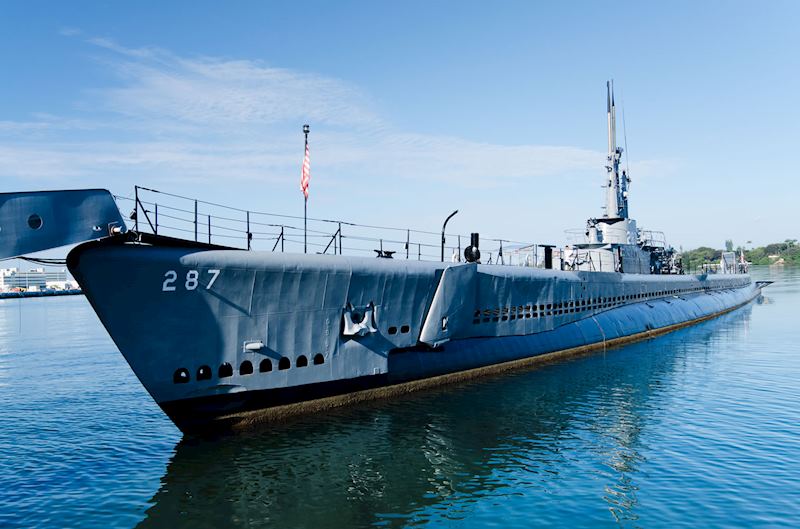

I couldn’t pass through Oʻahu without visiting the place where the USA’s involvement in World War II first began, Pearl Harbor. It was a moving experience visiting the site and seeing the names of more than 2,400 people who lost their lives engraved on the memorial plaque.
While three of the sunken battleships were raised and returned to service, the USS Arizona still resides in its watery grave. Its memorial is built over the wreckage, so you can look down and see the submerged ship.
Throughout the site are exhibits, displays and memorials related to the events leading up to the fateful day, what happened during the attack, and the people affected on both sides.
Where to stay on Oʻahu
The Halekulani Hotel is set on Waikīkī Beach, and every room and suite has a private lanai (balcony). As a guest, you gain free access to some of Oʻahu’s art and cultural venues.
The island of Hawaiʻi
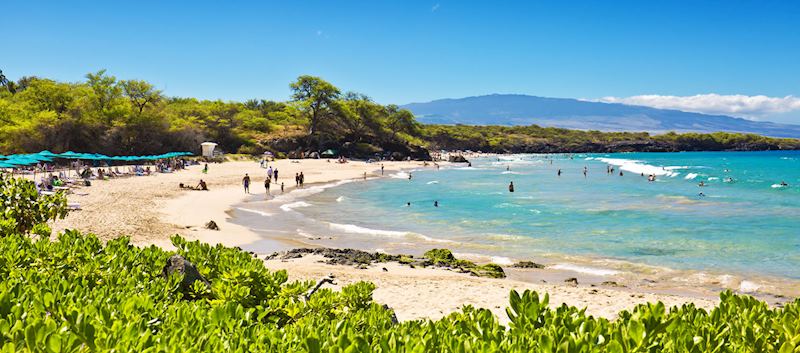
An island of two halves, the eastern side of the island of Hawaiʻi is dominated by Hawaiʻi Volcanoes National Park, home to some of the world’s most active volcanoes — including Kīlauea. The west, meanwhile, has a coastline made up of long stretches of pale-gold sand lapped by clear turquoise waters.
I personally liked Hāpuna Beach best, whose wide, soft sands are a designated state recreation area. Farther south is Kealakekua Bay, where Captain Cook was killed by islanders in 1779 — a large white monument marks the spot.
Inland, dense jungle hides misty waterfalls, and Hawaii’s highest peak, Mauna Kea, dominates the skyline.
There are airports at eastern Hilo and Kona in the west, so you can spend time on both sides of the island.
Hawaiʻi Volcanoes National Park
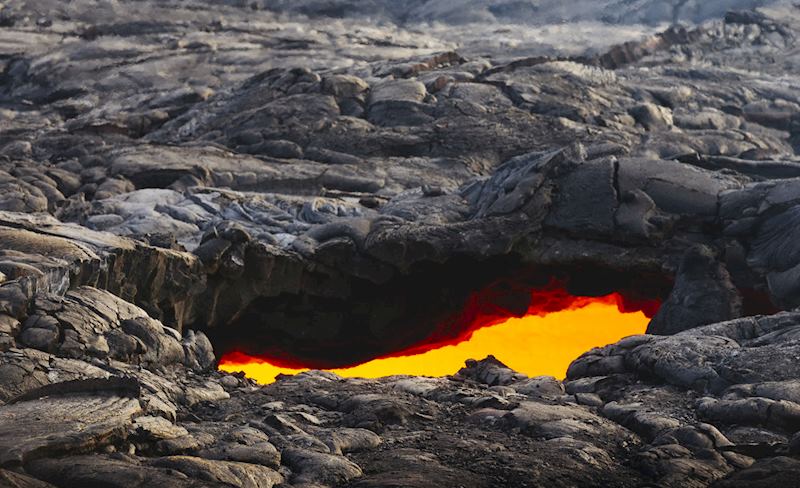
The island of Hawaiʻi is the largest island in the archipelago, as well as the most recently formed, and Hawaiʻi Volcanoes National Park is the best place in Hawaii to see the forces at work beneath the Earth’s crust. Here you can take in dark, sprawling lava fields strewn with boulders, steaming craters and cinder cones, and occasionally aglow with bubbling molten lava.
While a helicopter ride gives you a wide-angle perspective over the park and Kīlauea, it’s easy to explore the landscape independently by car and on foot. The Kīlauea Visitor Center has information on suggested hiking trails and drives that take in the drama of this dynamic landscape.
Exploring on foot, I passed huge chunks of charred debris and cracks in the ground filled with red molten lava. I walked across the charcoal-hued swirls of once-oozing lava, seeing where it had suddenly cooled, mid-flow, forming thick layers of stone. Sunken road signs are an eerie reminder of the lava’s destructive force.
The park also contains the Pu‘uloa archaeological site, where more than 23,000 petroglyphs were etched into the rock hundreds of years ago by native Hawaiians. You can follow a boardwalk to view some of the carvings, which include geometric patterns and images of people, canoes and animals.
Stargazing from Mauna Kea

The occasionally snow-covered dome of Mauna Kea sits between the two contrasting sides of the island of Hawaiʻi. Its height at 4,207 m (13,802 ft) and remoteness make it one of the best places on Earth for studying the night sky. Nightly tours will take you to the dormant volcano’s summit to view the heavens at the site where astronomers discovered several of Jupiter’s moons.
After an alfresco dinner, you’re driven for 45 minutes up the winding road to Mauna Kea’s peak. The air is much thinner here, so only those aged 16 and over are permitted. On my visit, the sea of clouds below us was tinged pink and violet as the sun sank. Above, orange, red and yellow streaks burst across the sky before it darkened and the first stars began to show.
We were then taken down to the Visitor Information Station, where public telescopes are set up each night. Our guide pointed out constellations and planets — I even made out the rings of Saturn.
Night-time snorkel with manta rays
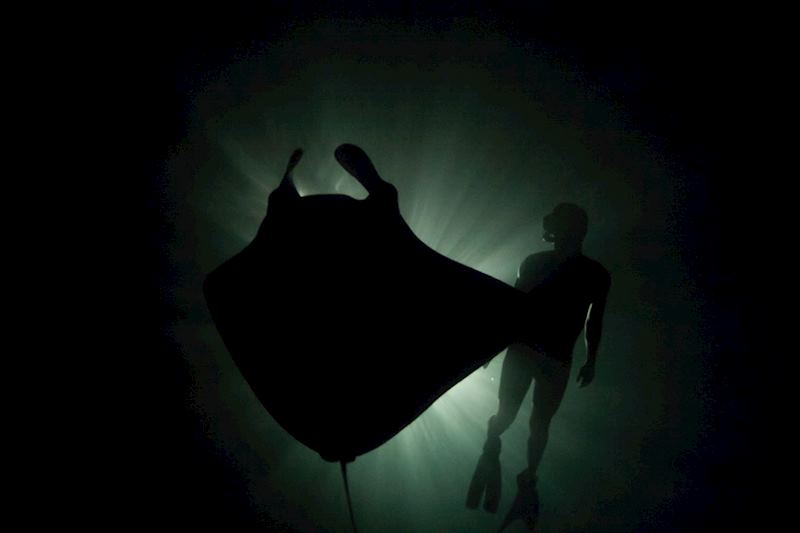
Just off Kona’s coast, as evening falls, plankton rises toward the ocean’s surface, which in turn attracts manta rays. Departing at dusk by boat with a guide, as part of a small group, you have the chance to see these elegant creatures (which can reach between 5 and 7 m [18 and 23 ft] in diameter) up close in their natural habitat.
After donning your snorkel gear, you enter the water and hold onto a raft fitted with specially designed diving lights that attract the plankton. As soon as my face was submerged I was astounded by how many manta rays were swimming just below me. It felt like I was watching a ballet as I observed their gentle, graceful movements as they fed, oblivious to my proximity.
Where to stay on the island of Hawaiʻi
In the west, the Four Seasons Resort Hualalai has an oceanfront setting on a stretch of golden sand.
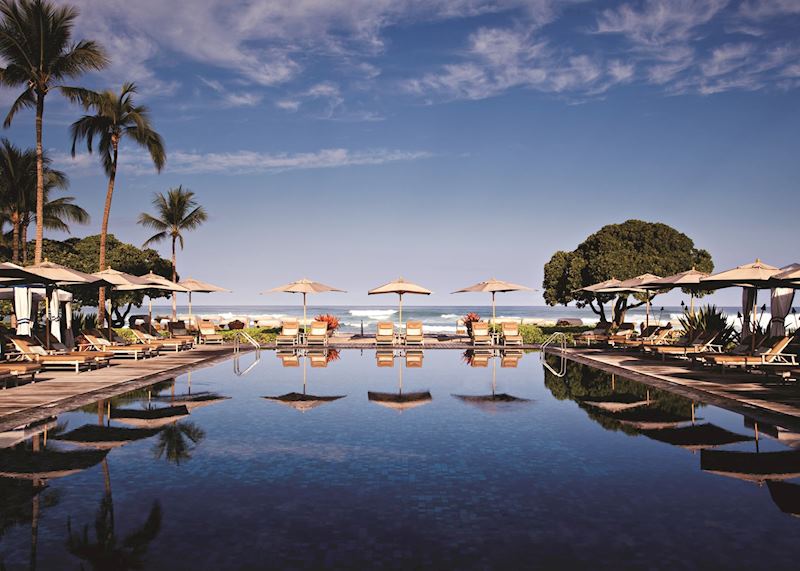
Maui
Dubbed the ‘Valley Isle’, Maui was the closest match to the Hawaii of my imagination: soft sands (both classic white and volcanic black), rainforests running with streams and waterfalls, and elevated points gazing down on sweeping views over the Pacific. It’s a honeymooner’s haunt, but in truth it would suit anyone who likes to combine beaches, wildlife and tropical island scenery.
The Road to Hāna
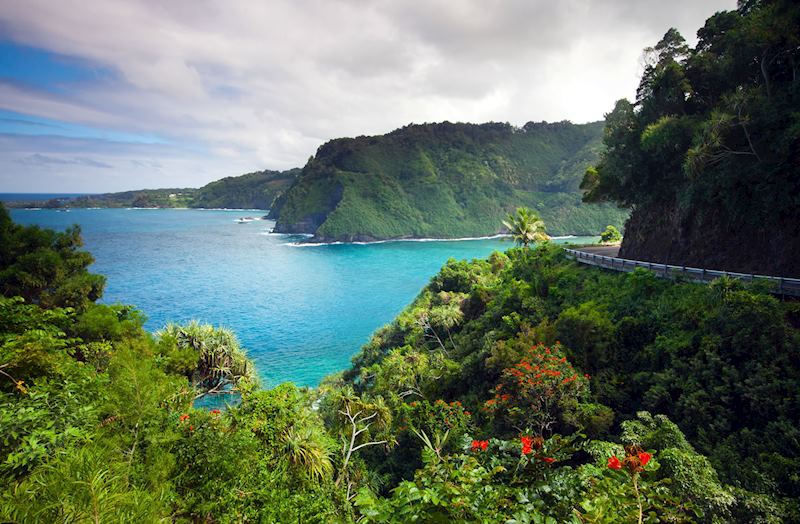
My last trip to Hawaii didn’t get better than winding along Maui’s northern coastline on the Road to Hāna. Stretching for 103 km (64 miles) between Kahului and Hāna, this scenic drive is more about the journey than the destination.
What would take a couple of hours without any breaks turns into a full day’s outing as the ocean views urge you to stop at every opportunity to take photographs, and mile markers pinpoint places of interest that tug at your adventurous side.
Trails lead to waterfalls and lagoons where you can take a dip, while Paʻiloa Beach’s black sand makes a novel change to the usual white or gold stretches. Shacks dotted along the road sell banana bread, coconuts and pineapples.
The drive climaxed when I stopped at Ho‘okipa Beach, just outside Hāna, at sunset. At this time throughout the year, groups of green sea turtles often come ashore for the night. I watched as around ten of them appeared from the waves and settled into the sand just a few steps away. A volunteer was on hand to answer questions and keep a buffer around these protected creatures.
Snorkeling in the Molokini Crater
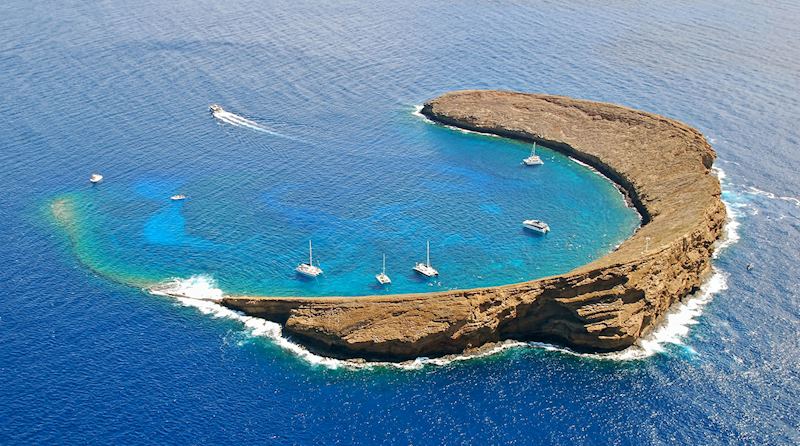
A vivid-green crescent rising from the sea just off Maui’s southwest coast, the Molokini Crater was formed some 200,000 years ago by a volcanic eruption. The coral reef inside the crater now supports an array of marine life and is a designated Marine Life Conservation District.
You can join a sailing trip out to Molokini to snorkel among the coral reef. Beneath the waves you might glimpse fish such as Picasso and reef triggerfish, the white-spotted puffer, yellow trumpet fish and parrotfish, as well as manta rays, moray eels, ornate (or white-striped) octopuses and reef sharks.
If you’re visiting between December and February, you can also look out for humpback whales, when they migrate to Hawaii from the Pacific Northwest to breed. You might also spot spinner dolphins and can listen to their calls using hydrophones.
Where to stay on Maui
Mama’s Fish House Restaurant & Inn is one of Hawaii’s only boutique properties, with just 13 beachfront and garden cottages. I particularly recommend it if you’re driving the Road to Hāna, as it’s near the start of the drive (or the end, if you do the return journey). Its restaurant — I’d say one of the best on the island — serves freshly caught seafood.
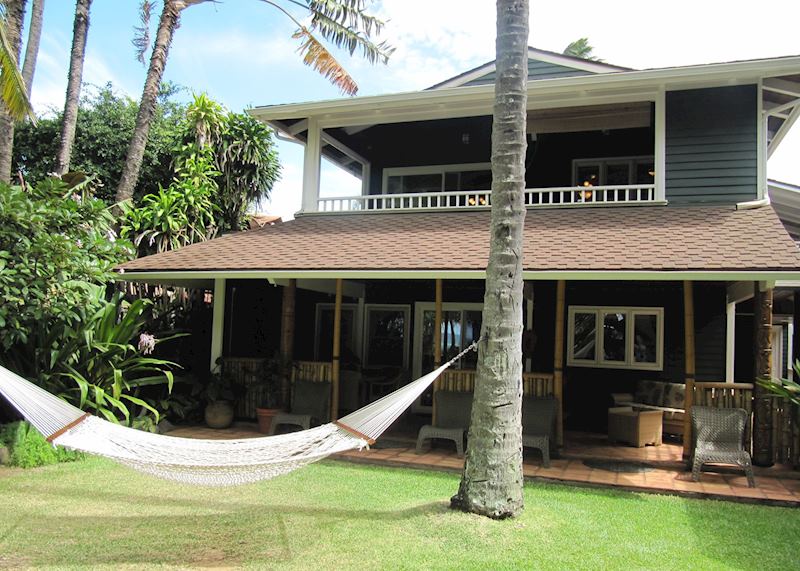
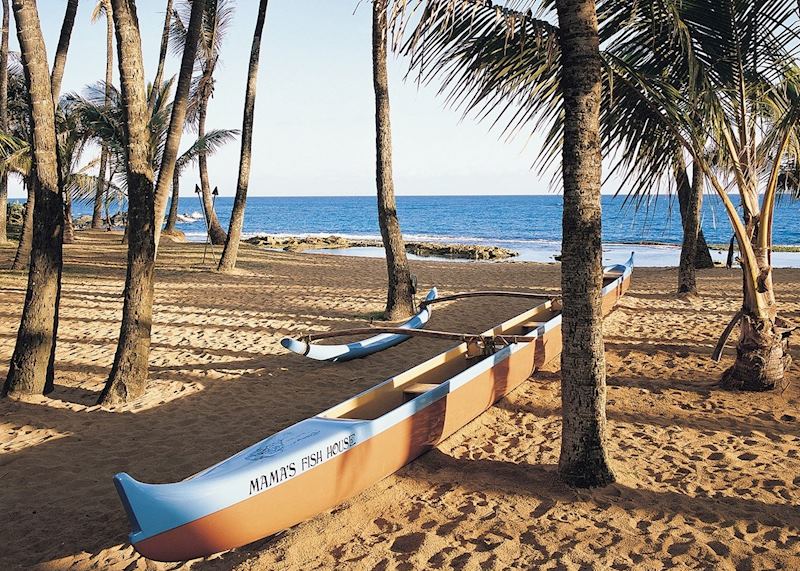
Kauaʻi
Sharp, folded peaks rise vertically from the ocean, the gray rock almost entirely covered in vegetation. With much of Kauaʻi’s steep-sided coastline only accessible by boat, helicopter or on foot, it feels wilder and remoter than the other islands. But the landscape hasn’t been overlooked by Hollywood: films such as Jurassic Park, South Pacific and Raiders of the Lost Ark used the island as a backdrop.
Helicopter trip over the island
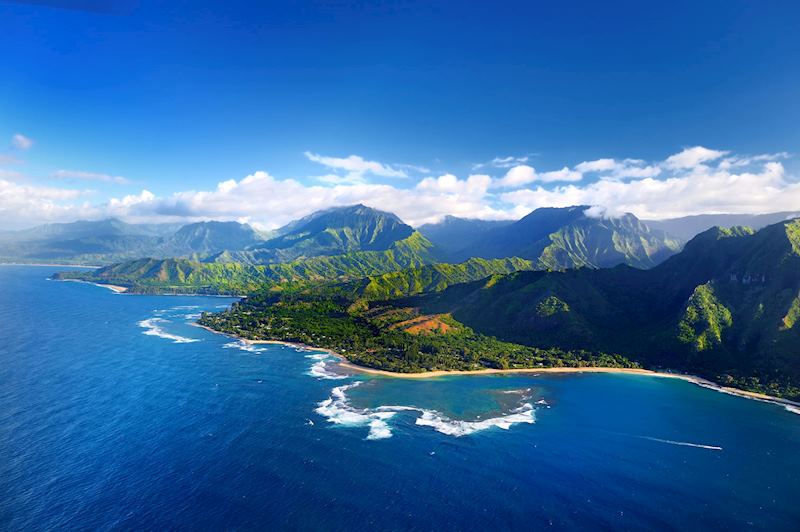
I found that to really get to know Kauaʻi, which has just one main road, you need to think about other methods of transport. A helicopter ride reveals the island’s volcanically shaped landscape of velvety green serrated peaks and tangled forest in its entirety.
In just an hour you drift over the heavily forested Hanapepe Valley, the splaying white waters of Manawaiopuna Falls (known as Jurassic Falls due to its appearance in the Hollywood blockbuster), and the Waimea Canyon. You also fly over the Nā Pali Coast, a stretch of steep, notched sea cliffs, deep-cut valleys and hidden sandy coves that’s so beautiful it’s sacred to Hawaiians.
Depending on the weather, you might also get the chance to fly into the heart of Mount Waiʻaleʻale, an extinct volcano reputed to be the wettest spot on Earth. As you descend into its crater, you’re surrounded by huge sheer-sided walls covered in vegetation and streaming with thin, wispy waterfalls.
Hiking around Kauaʻi
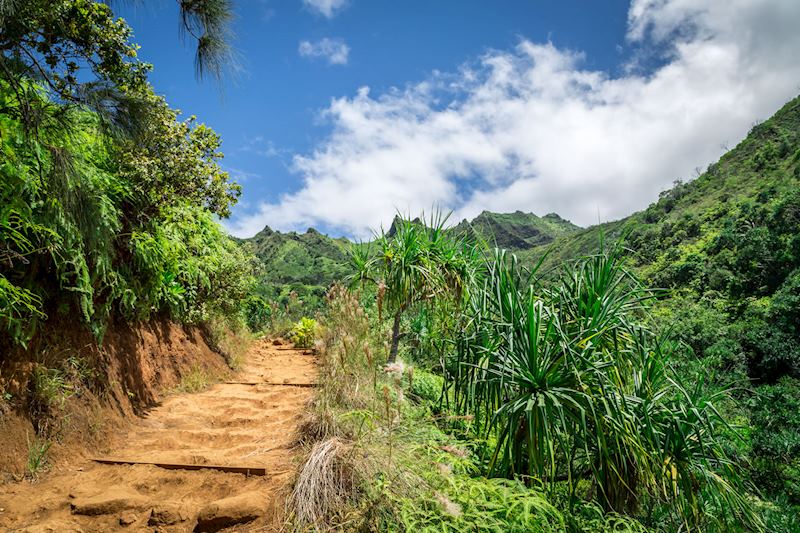
I’d argue that Kauaʻi is the best island for getting out and exploring on foot. Its dense forests feel undiscovered and are punctuated with waterfalls, caves and natural pools. Coastal trails give you access to dizzying cliffs and undisturbed beaches.
One of the more strenuous routes is the Kalalau Trail, an 18 km (11 mile) walk that winds along the Nā Pali Coast and into the Kalalau Valley, whose sides rise upward of 600 m (2,000 ft). The trail ends at the secluded Kalalau Beach at the base of the valley, where you can rest on the golden sand.
A gentler option is to stroll in Kōkeʻe State Park or follow the 2.4 km (1.5 mile) trail from the Kuilau trailhead. This takes you into the forest and eventually to views over the mountains and valleys below.
Where to stay on Kauaʻi
Koa Kea Hotel and Resort is one of the island’s smaller properties, and its low-rise buildings are more sympathetic to the surroundings. It’s set a few paces from a sandy beach, and you can rent equipment for snorkeling and surfing.
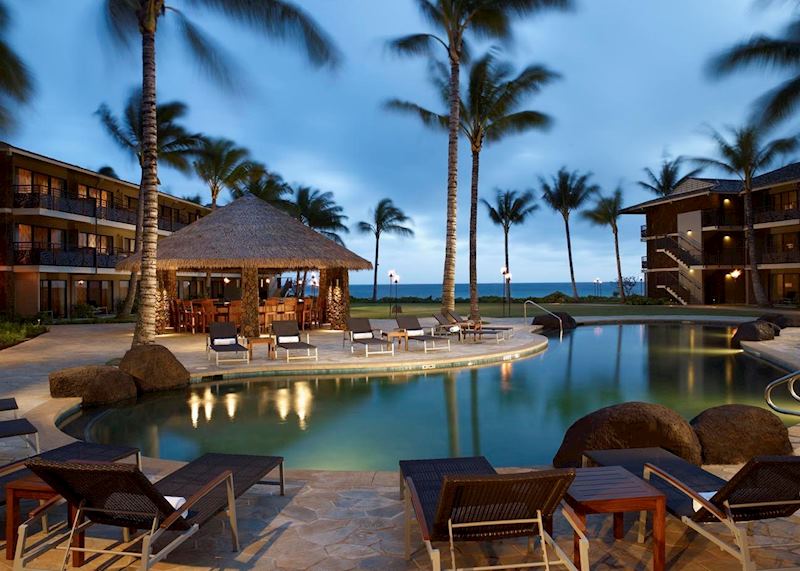
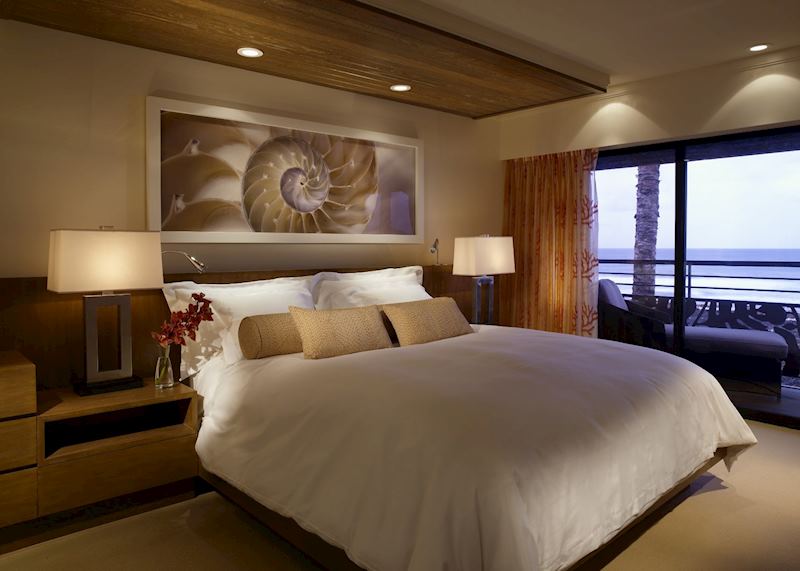
Cultural experiences in Hawaii
Whichever Hawaiian island you’re on, even the increasingly Westernized larger islands, you’ll get the sense that people here are still fiercely proud of their ʻohana (family heritage). Cultural practices continue to be passed down the generations.
Most large hotels hold regular luaus in the evening — traditional feasts accompanied by dance and song. They aren’t the most authentic experience, but they do open your eyes to the archipelago’s Polynesian influences. You’re given a lei (garland), and a whole pig is brought out and spit roasted. As you eat, performers tell stories through their indigenous songs and traditional dancing, creating a light-hearted atmosphere.
Molokaʻi and Lānaʻi
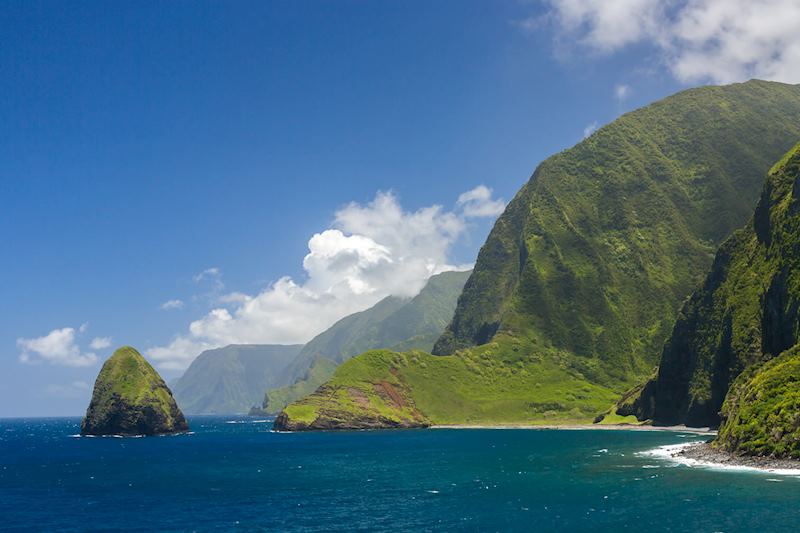
Seeing far fewer visitors, the smaller islands of Molokaʻi and Lānaʻi have unspoiled natural beauty and villages where a traditional rural lifestyle prevails. On Molokaʻi, the larger of the two, cultural events are held throughout the year, such as a celebration of hula dancing, which originated here, and outrigger canoe races. I also suggest visiting Kalaupapa National Historical Park, whose green hills sloping to wide and untouched sandy beaches belie its dark history as a former leprosy settlement.
On Lānaʻi, you can explore Kaunolū Fishing Village, the largest surviving ruins of a prehistoric Hawaiian village. You can also see Pu‘upehe (Sweetheart Rock) just offshore between Manele and Hulopoʻe Bay. Legend says that this sea stack was where a young warrior, Makakehau, buried his Hawaiian maiden before jumping into the waves.
Start planning your Hawaii trip
Start thinking about your experience. These itineraries are simply suggestions for how you could enjoy some of the same experiences as our specialists. They're just for inspiration, because your trip will be created around your particular tastes.
View All Tours in Hawaii
